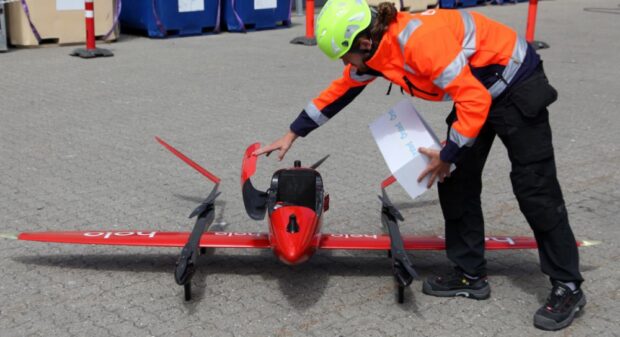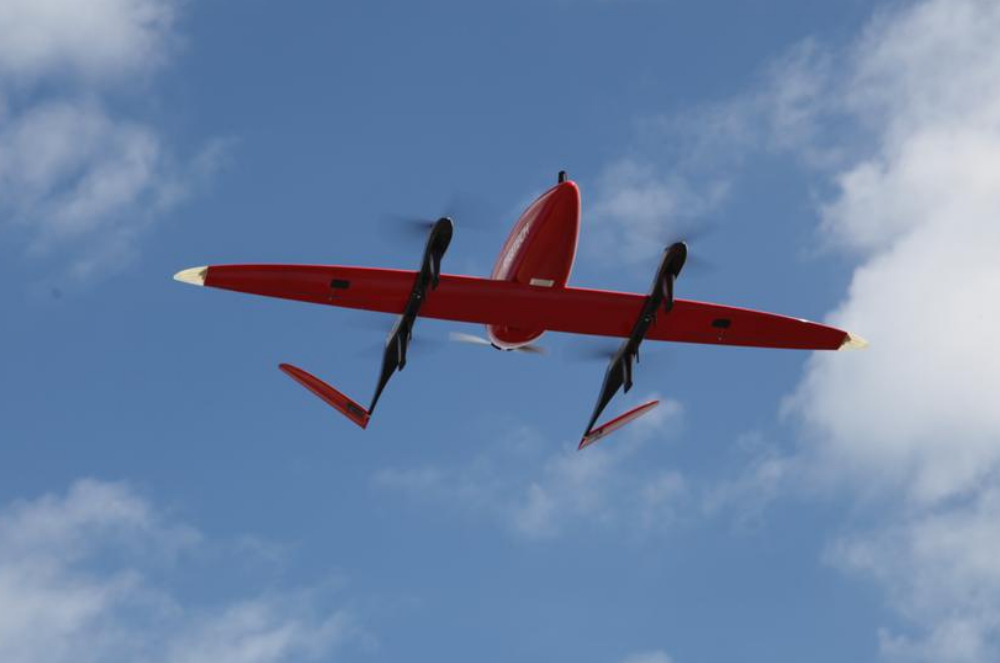Danish energy firm Ørsted is teaming up with Danish logistics firm DSV to trial drone deliveries of spare parts and equipment to its 400MW Anholt wind farm in the Kattegat area of the North Sea, between Denmark and Sweden.
Ørsted has the ambitious goal of becoming carbon-neutral by 2025 and is continually exploring new ways to ensure high wind farm availability and reduce carbon emissions from service logistics. DSV strives to continuously innovate and optimise its logistics services. Therefore, the two leading Danish companies share a common interest in assessing the role cargo drones potentially can play in sustainable logistics for offshore wind farms.
Fast and efficient alternative
Offshore wind farms are usually located far from shore, and the service technicians and necessary spare parts are usually transported by ship. Technicians bring their tools and the components most often needed for the wind turbines, but if special spare parts are needed, they must go back onshore to get them. This is both costly and time-consuming, and the repairs are therefore often delayed until the next day.
As an alternative, cargo drones can offer logistics support, especially for small spare parts, contributing to a much faster wind turbine restart
Klaus Baggesen Hilger, Head of Operations Digital & Innovation at Ørsted, said:
“At Ørsted, we’re constantly exploring new opportunities to minimise downtime for wind turbines and increase renewable power production. Together with DSV, Ørsted has launched an initiative to bring the spare parts warehouse closer to the service technicians, thereby ensuring that the wind turbines get back online more quickly. The drones are powered by renewable electricity and will fly autonomously to the offshore substation, but we’re hoping to test the drones on flights to the wind turbines at a later stage. By being able to quickly and efficiently deliver the spare parts needed for repairs, wind turbine downtime can be reduced, thereby increasing the production of clean energy. At the same time, the need for transport by ship is reduced as well as the carbon emissions from operating offshore wind farms.”
DSV is a transport and logistics leader in Denmark and the world’s third-largest player in the area. Therefore, it was natural for DSV to take part in the trial, as the company is dedicated to innovation and automation focused on developing their logistics services. DSV is already using drones in its own logistics centres and sees potential opportunities in using drone technology in new contexts.
Peter Matthiesen, Head of Innovation & Digital Products at DSV, said:
“At DSV, we’re constantly working to create optimal supply chains for our customers, so it was a good opportunity for us to collaborate with Ørsted on optimising their supply chain from the shore to offshore wind farms. It’s fast, cost-effective, and renewable, so we’re looking forward to performing the test flights.”
The oversea trials from Grenaa to Anholt are the first of their kind, and the partnership between Ørsted and DSV will explore opportunities for using drone technology at sea.
About the test flights
The test flights will run over two weeks, during which the drone will demonstrate that it is capable of delivering components from Ørsted’s operations base at the Port of Grenaa to the offshore substation 25 km out at sea and, potentially, to the wind turbines. The trials will be conducted using an electric drone with a range of 100 km and a payload capacity of 2.5 kg. The aim of the trials is to test whether cargo drones can serve as a realistic logistics supplement for the company’s many offshore wind farms in operation.
DSV has engaged the services of Swiss drone supplier RigiTech and Danish operator Holo, both of whom specialise in autonomous mobility solutions. RigiTech and Holo will both support the drone test flights.
Source: Press Release


